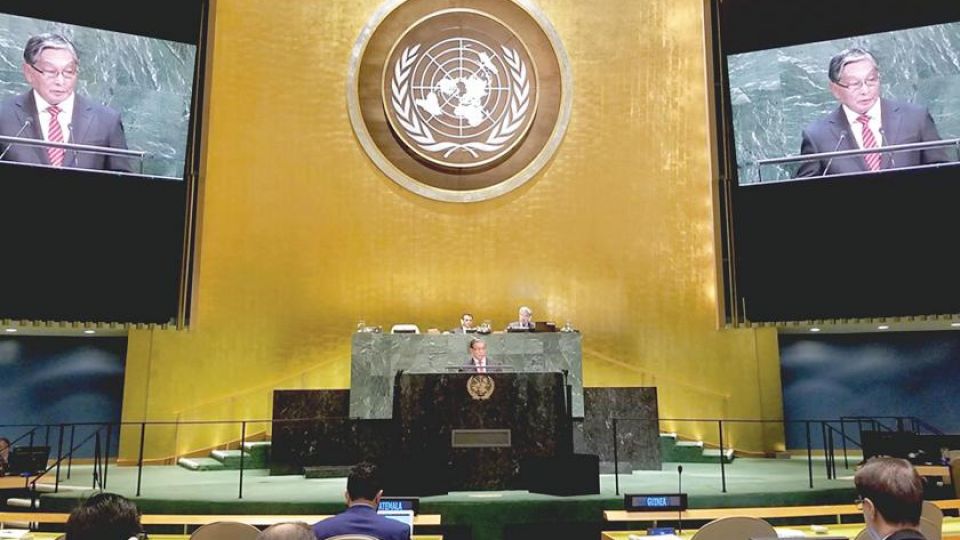October 2, 2019
The issue in Rakhine is one of the complex challenges faced by Myanmar on its path towards democracy.
Union Minister Kyaw Tint Swe of State Counsellor Office called on Bangladesh to faithfully implement the bilateral agreement, which is the only feasible way to resolve the issue of the displaced persons and allow the speedy repatriation of those who have long expressed their desire to return, responding that ICC doesn’t have jurisdiction over Myanmar.
The remarks came from Union Minister Kyaw Tint Swe’s statement to the high-level General Debate on the fifth day of the74th Session of the United Nations General Assembly held on 28 September 2019 at the United Nations Headquarters in New York.
“We call on Bangladesh to faithfully implement the bilateral agreement, which is the only feasible way to resolve the issue of the displaced persons. We also call on Bangladesh to allow the speedy repatriation of those who have long expressed their desire to return, including some 400 people of Hindu faith. Grand standing, introducing new elements, putting forward new conditionalities will be a futile exercise,” said Union Minister Kyaw Tint Swe.
“Our democratic transition is still young and as yet incomplete. As we struggle to step out from poverty’s shadow, while striving for inclusive development and peace, we must overcome a range of challenges, from imperfect Constitution to continued conflicts. The situation in Rakhine State, an issue that has deep and historical roots, counts amongst these challenges,” said Union Minister Kyaw Tint Swe.
The issue in Rakhine is one of the complex challenges faced by Myanmar on its path towards democracy. The government has been striving through a holistic approach for long term stability, security and sustainable development in the State. Our priority now is to expedite repatriation and to create a more conducive environment for verified returnees, Union Minister Kyaw Tint Swe added.
Union Minister Kyaw Tint Swe continued to say, “We cannot help but conclude that these were prompted more by hostility towards the democratically elected government and the peace loving people of Myanmar than by a genuine desire to resolve the challenges of Rakhine State. Therefore, we also reject the establishment of the new Investigation Mechanism (IIM) set up to bring Myanmar to tribunals to which we object strongly. These include the International Criminal Court (ICC). Our position on the ICC is abundantly clear. The ICC does not have jurisdiction over Myanmar.”
The displaced persons now in Cox’s Bazar who had been resident in Rakhine State have different legal status. We are willing to repatriate them in accordance with the bilateral agreement signed between Myanmar and Bangladesh. The agreement calls for the issuance of identity cards to the returnees. Those who qualify for citizenship under our Citizenship Law will be issued with citizenship cards. The rest will be issued with National Verification Cards (NVC). NVCs are similar to the “green card” much sought after by immigrants in the United States, said Union Minister Kyaw Tint Swe in his statement.
“Myanmar strongly holds the view that issues between neighbours can and must be resolved bilaterally in an amicable and friendly manner. The current issue of displaced persons in Cox’s Bazar can and must be resolved bilaterally, particularly as Myanmar and Bangladesh have signed a bilateral agreement to address this issue since November 2017. There have been persistent calls to put pressure on Myanmar. There is also a call to set up a “Safe Zone” inside Myanmar. Such a demand is neither warranted, nor, workable,” said Union Minister Kyaw Tint Swe.
On 4 July 2019, the Prosecutor of the International Criminal Court requested a pre-trial chamber to authorise an investigation into Rakhine-allegations. Independent scholars have already identified the request as problematic in that: it excludes alleged crimes committed by the Arakan Rohingya Salvation Army (ARSA) with deliberate omission of the undisputed fact that their actions precipitated the displacement; that she relies heavily on human rights reports that contain factual errors with regard to both international and Myanmar law; and that her request mischaracterizes the criminal justice system of Myanmar. This critique is all the more serious when we consider that Myanmar is not a party to the Statute of the International Criminal Court, said Union Minister Kyaw Tin Swe.


